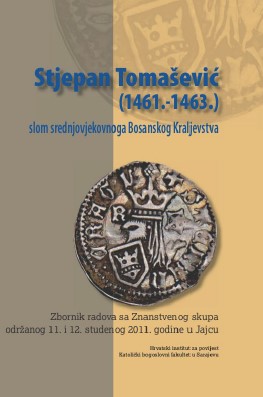Historiografija o padu Bosanskog Kraljevstva
The Fall of the Bosnian Kingdom in Historiography
Author(s): Emir O. Filipović
Subject(s): Military history, Political history, Government/Political systems, 15th Century, The Ottoman Empire, Peace and Conflict Studies
Published by: Hrvatski institut za povijest
Keywords: Bosnian Kingdom; Ottoman Empire; Turks; Stjepan Tomašević;
Summary/Abstract: The paper presents a short review of historiography examining the Ottoman conquest of the Bosnian Kingdom in 1463, with an emphasis on opinions and evaluations of historians from the Ragusan writers and chroniclers of the sixteenth and seventeenth centuries to the modern critical historiography. Since the gradual expansion of the Ottoman Empire in South-Eastern Europe may be viewed as a single process, some historians wanted to draw a parallel between the Bosnian case and the examples of other states that fell under the Ottoman rule during the fourteenth and fifteenth centuries. Even though the grounds for these comparisons are understandable, it is very difficult to learn anything from them. Circumstances to which individual rulers and their states, from the Byzantine Empire, Bulgaria and Serbia to other smaller or larger principalities, were subjected were essentially different. In these comparisons historiography has given a negative evaluation of Bosnia’s struggle and its rulers. Someone had to be responsible for the fall of the Kingdom and the blame was almost exclusively assigned to the last two Bosnian kings. In line with the times in which they lived and contemporary historiographical trends, some historians attributed the quick fall of Bosnia to internal factors, such as conflicts within the state and the complex religious situation including the presence of heretics. The most commonly cited argument was the discord between the nobles and betrayal, even though the latter is mentioned in only one authentic contemporary diplomatic source. The work of these historians served as a basis for the myth of an easy and simple breakdown of the medieval Bosnian state in which the Bogomil betrayal played an important part. Contemporary critical historiography concluded that this myth was created by Bishop Nikola of Modruš, the papal legate in Bosnia, in order to justify his own wrong policy that hastened the unavoidable fall of the Kingdom. Only a small number of historians studying this topic looked at the broader picture and took external as well as internal factors under consideration. This is especially evident in older literature which, inspired by patriotism, ethical values and the concept of hero-ism, paints a more negative image of Bosnia’s fall. If we consider all the available sources, and critically analyze those of Roman and Hungarian origin, we gain the impression of a rapid surge of the Ottoman army into Bosnia, intense fighting under Bobovac and other Bosnian fortresses, strong resistance of the defenders, destruction and mass deportations of population, general panic and emigration towards the Adriatic and the islands.
Book: Stjepan Tomašević (1461.-1463.) - slom srednjovjekovnoga Bosanskog Kraljevstva - Zbornik radova
- Page Range: 11-28
- Page Count: 18
- Publication Year: 2013
- Language: Croatian
- Content File-PDF

